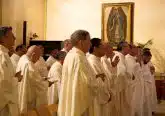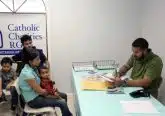US bishops push for pathway to citizenship for millions of immigrants
by Matt Hadro
Washington D.C., Sep 15, 2021 / 11:20 am
As members of Congress this week advanced language providing a pathway to citizenship for millions of undocumented immigrants, the U.S. bishops’ conference praised the development.
Congress is currently crafting a $3.5 trillion budget package that would fund many Biden administration priorities, such as universal pre-K, child care benefits, additional health care subsidies, green energy initiatives, and permanent residence for millions of immigrants.
Currently, House committees are in the process of approving language for the budget package. The House Judiciary Committee on Sept. 13 approved language creating a pathway to citizenship for millions of undocumented immigrants.
“For decades, the bishops of the United States have been proponents of such reforms, which promote integration and family unity,” said Bishop Mario Dorsonville, chair of the U.S. bishops’ conference immigration committee, on Wednesday.
He urged that such immigrants be granted a pathway to citizenship, and not be allowed to reside in the United States with a dubious legal status.
“We cannot persist in relegating these members of our society to the margins, especially when we simultaneously depend on so many of them for our collective wellbeing,” he said.
While implying that parts of the budget package are contrary to Catholic social teaching, Bishop Dorsonville praised the immigration language.
“Undoubtedly, Catholic social teaching will be implicated by many aspects of this budget reconciliation bill, but this is a welcome milestone for many families and the common good,” he said of the immigration provisions.
Pro-life groups have warned that the reconciliation bill could ultimately include billions of dollars in health care spending without pro-life protections, thus allowing for a significant increase in federal funding of abortions and abortion providers.
The budget package would need to be passed through the process of reconciliation, a procedure by which budget-related items need only a simple majority vote in the Senate rather than the normal 60 votes to overcome a filibuster.
The Senate parliamentarian rules whether certain items are budget-related, and thus can be included in a reconciliation bill. It is unclear if the parliamentarian would maintain immigration language in the bill; the parliamentarian reportedly met with Democratic staffers last week and this week, who presented their case for why the immigration proposals should stay.
“We call on both the House and Senate to include these provisions in the final reconciliation bill and for Congress to pass a bill that helps all those on the margins of our society, strengthens families, protects religious freedom, promotes care for creation, and respects the rights and dignity of every human life, from conception to natural death,” Bishop Dorsonville stated.
Those eligible for citizenship, under the House Judiciary Committee proposal, would include Dreamers, Temporary Protected Status (TPS) holders, Deferred Enforced Departure beneficiaries, undocumented agricultural workers, and other undocumented essential workers.
“Dreamers” are undocumented immigrants who were brought to the United States illegally as children, but who are eligible to apply for permanent residence. “Temporary Protected Status” is granted to immigrants from certain countries who are eligible for a delay of deportation, due to conditions in their home countries that prevent their safe return such as natural disasters or armed conflict.
At a Monday evening virtual event hosted by the advocacy group Faith in Action, other U.S. bishops emphasized the need to include a pathway to citizenship in the reconciliation bill.
The present situation is the “closest we’ve come” since 1986 to reaching a pathway to citizenship, Archbishop John Wester of Santa Fe said.
For immigrants working in certain essential industries, “it would be the height of ingratitude,” Wester said, “if we can’t at least do something to forge a pathway to citizenship.”
“I think what’s at stake is not simply the rights of eight million or more,” said Cardinal Joseph Tobin of Newark, “but really, our own salvation, our own holiness.”
Pope Francis, he said, has emphasized the issue of immigration “to show us the pathway to holiness,” who “profess that we have faith but not have works to show it.”













